
-
 Shares in 'Baby Shark' studio jump on market debut
Shares in 'Baby Shark' studio jump on market debut
-
Thunder breeze past Pelicans, Pistons overpower Pacers

-
 Grieving Cowboys remember Kneeland, defeat Raiders
Grieving Cowboys remember Kneeland, defeat Raiders
-
Loaf behind bars: Aussie inmate says Vegemite a human right

-
 In film's second act, 'Wicked' goes beyond Broadway musical
In film's second act, 'Wicked' goes beyond Broadway musical
-
Asian markets track Wall St down with Nvidia, US jobs in view
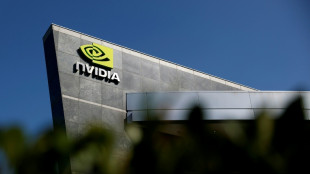
-
 Scott Boland: the best 'spare' fast bowler around
Scott Boland: the best 'spare' fast bowler around
-
Fire and Ashes: England bank on fast bowling barrage in Australia

-
 North Korea says Seoul-US sub deal will trigger 'nuclear domino' effect
North Korea says Seoul-US sub deal will trigger 'nuclear domino' effect
-
Education for girls hit hard by India's drying wells
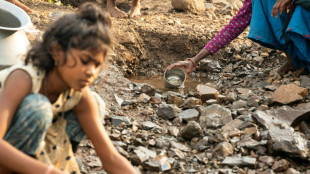
-
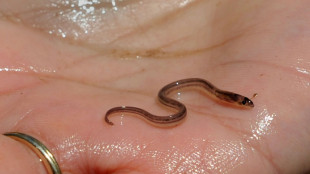 Haitian gangs getting rich off murky market for baby eels
Haitian gangs getting rich off murky market for baby eels
-
Trump says will talk to Venezuela's Maduro, 'OK' with US strikes on Mexico

-
 Oscar Piastri wins Australia's top sports honour
Oscar Piastri wins Australia's top sports honour
-
'Severely restricted': Russia's Saint Petersburg faces cultural crackdown
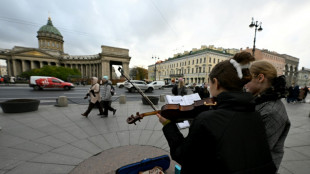
-
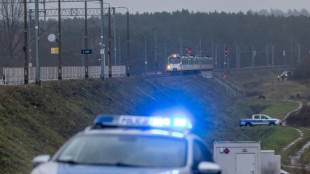 Polish PM denounces 'sabotage' of railway supply line to Ukraine
Polish PM denounces 'sabotage' of railway supply line to Ukraine
-
UK toughens asylum system with radical overhaul

-
 Carney's Liberals pass budget, avoiding snap Canada election
Carney's Liberals pass budget, avoiding snap Canada election
-
LeBron back in training, edges closer to Lakers return

-
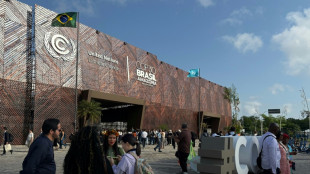 Climate talks run into night as COP30 hosts seek breakthrough
Climate talks run into night as COP30 hosts seek breakthrough
-
Germany and Netherlands lock up World Cup spots in style

-
 Germany's Woltemade hopes for 2026 World Cup spot after scoring again
Germany's Woltemade hopes for 2026 World Cup spot after scoring again
-
Germany 'send message' with Slovakia rout to reach 2026 World Cup

-
 Trump unveils fast-track visas for World Cup ticket holders
Trump unveils fast-track visas for World Cup ticket holders
-
Netherlands qualify for World Cup, Poland in play-offs

-
 Germany crush Slovakia to qualify for 2026 World Cup
Germany crush Slovakia to qualify for 2026 World Cup
-
Stocks gloomy on earnings and tech jitters, US rate worries

-
 'In it to win it': Australia doubles down on climate hosting bid
'In it to win it': Australia doubles down on climate hosting bid
-
Former NFL star Brown could face 30 yrs jail for shooting case: prosecutor

-
 Fate of Canada government hinges on tight budget vote
Fate of Canada government hinges on tight budget vote
-
New research measures how much plastic is lethal for marine life

-
 Mbappe, PSG face off in multi-million lawsuit
Mbappe, PSG face off in multi-million lawsuit
-
EU defends carbon tax as ministers take over COP30 negotiations

-
 McCartney to release silent AI protest song
McCartney to release silent AI protest song
-
Stocks tepid on uncertainty over earnings, tech rally, US rates

-
 Louvre shuts gallery over ceiling safety fears
Louvre shuts gallery over ceiling safety fears
-
'Stranded, stressed' giraffes in Kenya relocated as habitats encroached

-
 US Supreme Court to hear migrant asylum claim case
US Supreme Court to hear migrant asylum claim case
-
Western aid cuts could cause 22.6 million deaths, researchers say

-
 Clarke hails Scotland 'legends' ahead of crunch World Cup qualifier
Clarke hails Scotland 'legends' ahead of crunch World Cup qualifier
-
S.Africa says 'suspicious' flights from Israel show 'agenda to cleanse Palestinians'

-
 South Korea pledges to phase out coal plants at COP30
South Korea pledges to phase out coal plants at COP30
-
Ex-PSG footballer Hamraoui claims 3.5m euros damages against club

-
 Mbappe, PSG in counterclaims worth hundreds of millions
Mbappe, PSG in counterclaims worth hundreds of millions
-
Two newly discovered Bach organ works unveiled in Germany

-
 Stocks lower on uncertainty over earnings, tech rally, US rates
Stocks lower on uncertainty over earnings, tech rally, US rates
-
Barca to make long-awaited Camp Nou return on November 22

-
 COP30 talks enter homestretch with UN warning against 'stonewalling'
COP30 talks enter homestretch with UN warning against 'stonewalling'
-
France makes 'historic' accord to sell Ukraine 100 warplanes

-
 Delhi car bombing accused appears in Indian court, another suspect held
Delhi car bombing accused appears in Indian court, another suspect held
-
Emirates orders 65 more Boeing 777X planes despite delays


How much damage could possible Iceland volcano eruption cause?
A town has been evacuated in southwestern Iceland after hundreds of earthquakes caused by shifting underground magma sparked fears of a full-blown volcanic eruption.
While experts fear the town could be badly damaged by a potential eruption, they do not expect a repeat of the global travel chaos caused by ash from the Eyjafjallajokull volcano in 2010.
Here are a few key questions answered:
- What and where? -
The hundreds of earthquakes have been caused by a massive build-up of magma in a 15-kilometre (nine-mile) fissure between two to five kilometres underground.
The fissure is around 3.5 kilometres northwest of Grindavik, a town of 4,000 people on the Reykjanes peninsula. The town has been evacuated as a precaution.
On Wednesday, residents told AFP the seismic activity had damaged roads and buildings.
Previous eruptions near the Fagradalsfjall volcano on Reykjanes peninsula took place in 2021, 2022 and earlier this year, though in less populated areas.
Situated in the North Atlantic, Iceland straddles the Mid-Atlantic Ridge, a crack in the ocean floor separating the Eurasian and North American tectonic plates.
- How likely is an eruption? -
The Icelandic Met Office said on Wednesday that the "probability of an eruption is still considered high".
Vidir Reynisson, head of Iceland's Civil Protection and Emergency Management agency, told AFP on the weekend that "anywhere on that fissure we can see that an eruption could happen".
John Smellie, a volcanologist at the UK's Leicester University, said guessing when the eruption might take place was like guessing "how long is a piece of string".
Smellie told AFP it could be days or weeks -- or "despite all evidence, it might just subside and go away".
- How bad could it be? -
Reynisson said Icelandic experts were "really concerned about all the houses and the infrastructure in the area".
Smellie said any eruption would most likely be similar to the one on the peninsula earlier this year, which created lava fountains and flows that mostly just attracted tourists.
If a new eruption occurs near Grindavik, it could cause significant damage to homes and infrastructure, he added.
However lava flows "relatively slowly, and people can generally at least drive away or run away from it," he said, meaning that deaths were unlikely.
Another possible threat is toxic gas released during an eruption. A 1783 eruption at Iceland's Laki volcanic fissure killed enough livestock to cause widespread famine.
However Phil Collins, a geologist at Brunel University London, said that "it doesn't look like a Laki-scale disaster is likely".
One way the eruption could be more violent is if it blows through ice or water.
If the eruption occurs in the southern tip of the fissure, which is underwater, it could cause ash clouds that would affect flights at Iceland's international airport.
- Different to Eyjafjallajokull?
But any eruption is not expected to have anywhere near as much impact as the one from the Eyjafjallajokull volcano in 2010.
That eruption shot huge amounts of ash into the atmosphere, forcing the cancellation of some 100,000 flights and leaving more than 10 million travellers stranded.
It exploded through 200 metres of ice, making it "highly violent", Smellie said. The interaction with the water created more fine ash particles that would then drift across Europe.
The latest eruption threat is "completely different situation" Smellie said.
C.AbuSway--SF-PST




